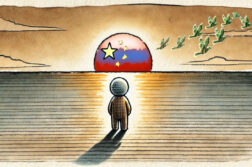The outcome of the investigation into Craig Thomson is critical to the future of the Labor government. The former national secretary of the Health Services Union is still facing accusations that he used his union credit card to pay for escort services. The NSW branch of the Labor party has spent somewhere in the vicinity of $90,000 to cover his legal costs in a suit against the HSU and Fairfax Media over the allegations. Julia Gillard has repeatedly, and with confidence, supported him. Why has this matter gained so much of our attention? Is it simply the fragile state of the government? Can we not resist a sex scandal? Or are we fascinated by the depths some of us will sink to in order to maintain power?
Craig Thomson is behaving like the one kid in the family who never really gets in trouble. The kid who’s always protected from the consequences of his actions because of the self-interest of one or both of his parents. The kid who never really has to defend himself because someone always steps in and does it for him. When this happens in a family, not only does this kid usually lack self-discipline, the rest of the family loses hope that there is any fairness or integrity in the system at all. Maintaining and exercising power becomes the only goal.
A good friend of mine is pretty unhappy with her long-term partner. He works constantly and not necessarily out of passion or necessity. He is unavailable emotionally to her and to their children and he isn’t interested in any action they might take to improve things between them. He wasn’t always this way, but for whatever reason this is how he is choosing to be now.
My friend is a strong and capable woman who has been out of the workforce and at home with three young children for over 12 years. As her partner’s behaviour has gotten worse, her desire to defend him against the criticism of her friends and her own dissatisfaction has increased. She says she doesn’t really know what’s going on for him. She says he must be having a difficult time. Or she avoids the conversation altogether.
What she is really saying is that she needs him. It’s almost impossible to hold people accountable when we need them. She has given up a measure of integrity in order to avoid a loss of power over her life as she knows it.
We often do this in relationships when we are dependent, financially or otherwise. Like Gillard, we say we’re sure everything’s fine, when what we mean is that we don’t want to know. We want things to stay the same, we fear change and we don’t want to lose power or position. We defend those close to us who are hurting us because we are really defending ourselves. If they’re not okay, then in some way we must not be okay either. Like so many of us, my friend is simply protecting her interests by ignoring the evidence.
What this means for us, her friends, is that we are pushed further and further away from her. She is more isolated as a result and we become more critical. As his behaviour gets worse and it becomes harder and harder for her to ignore, she becomes more and more complicit in her own unhappiness and so needs to defend him even more strongly.
As time goes by it becomes even more difficult to tell the truth about her partner. And his behaviour has deteriorated further in an environment where he has free reign and little accountability. Not unlike Craig Thomson, he doesn’t need to defend himself well or to modify his behaviour, because someone else is doing all the work for him.
Part of what I think both fascinates and shocks us about Julia Gillard’s ongoing defence of Craig Thomson, is the very familiar moral balancing act she is performing between her dependence on him in order to maintain power and her need to demonstrate personal and political integrity. We recognise this dilemma and this in itself is gripping.
The fact that part of the accusations against him involve sex workers adds to our interest because this is something about which there is a great deal of shame, denial and criticism, and in Thomson’s case there has been almost no moral discussion about this issue. While in some ways this is refreshing, I’m not sure it stems from a genuine attitude of acceptance. Instead, by leaving out our emotional response, we may have missed an opportunity to name the nature of the moral dilemma facing the government.
When we stick to reason only and leave out emotion, moral decision-making becomes impossible. We try to control our emotions the most strongly when we are trying to hold onto power, and the simple maintenance of power is always an amoral position. This is the kind of decision-making that psychopaths practice. Neurologically speaking, moral decisions are closer to aesthetic ones; they require a process of feeling into rather than just observing from afar. Moral decisions take the effect of our actions on other people into account.
I’m not saying that in this case that either the media response or the Gillard government’s support is pathological, but it does seem to be devoid of morality. Like my friend, I think part of what is happening here is fuelled by the knowledge that if we really face up to what is happening, the whole house of cards will crumble.
As Michelle Grattan recently put it, in the matter of Craig Thomson "propriety will come a bad second to survival". In the struggle to maintain power in this case a lot has already been sacrificed. The question will be, as it is for all of us in similar situations, whether the sacrifice of integrity in the interests of maintaining power carries with it more losses than gains.
ABOUT THERAPY FOR NEWS JUNKIES: Why does the news make the news? Why do certain stories gain such traction? Therapy For News Junkies is a regular NM column which looks at why audiences react so vehemently to particular issues. Zoe Krupka is a psychotherapist who uses her knowledge about how we react as individuals to better understand collective responses to the events of the day.
Donate To New Matilda
New Matilda is a small, independent media outlet. We survive through reader contributions, and never losing a lawsuit. If you got something from this article, giving something back helps us to continue speaking truth to power. Every little bit counts.




